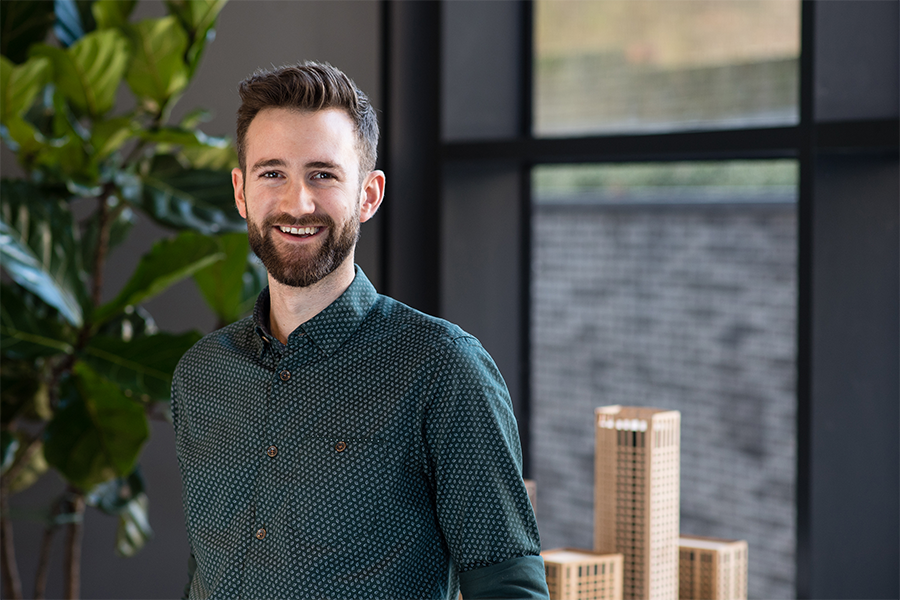Collective Action on Mental Health

Ben Channon is an Associate and Mental Wellbeing Ambassador at Assael Architecture, and chair of the Architects’ Mental Wellbeing Forum in the UK. Ben talks us through the forum’s origins and ambitions.
How did the Architects’ Mental Wellbeing Forum come to be?
I decided to set up the forum a couple of years ago after seeing quite a few architects go through difficult times. I myself had what I call ‘a wobble’ in my mid-twenties, which I put down mostly to overwork and putting far too much pressure on myself to be perfect. This led to some problems with anxiety, which thankfully I was able to overcome through daily mindfulness and some CBT therapy.
I began to realise this was a very common problem within architecture, although not many people were open about it – so my Chairman John Assael and I sat down one day and tried to work out how we could improve this. John got in touch with some of the practices best known over here in the United Kingdom for their approach to staff welfare, and we now meet quarterly to share knowledge and create initiatives to support architects.
What are the forum’s main goals?
The group was founded in late 2017 in an attempt to improve mental health within architecture. It was borne out of a belief that we as an industry could all improve our understanding of mental health, and subsequently provide better environments for the mental wellbeing of people working in architecture.
As a result of a number of factors, such as long hours and a culture of perfectionism, we believe architects are particularly vulnerable to problems with their mental health. This has been illustrated by the sad but noticeable increase in mental health problems reported by students in Architects’ Journal surveys in recent years.
Our mission therefore is to share knowledge and learn from our own experience, as well as research other ways to support architects’ mental health in the workplace, with the goal of improving mental wellbeing throughout architecture. We meet quarterly to share our findings and discuss new ideas for nurturing mental wellbeing.
How can individual practices get involved in the forum? How much interest have you had?
Since we launched our website earlier this year, we have had a lot of interest, and it has been really encouraging to hear how enthusiastic many architects are about tackling this problem. We have put out a request for ‘Supporting Practices’ to show their support for this cause by placing their logo on our website, as a sign that they are committed to improving mental health in the industry. The aim really is for this to develop into a ‘charter’ that we will be asking practices to sign. We will also be launching our first Mental Wellbeing Toolkit for Architects in June this year, which will be available online.
What is the geographical reach of the forum? Is it mainly based in London? Or across the UK?
The forum meets in London, but we do have representatives from other parts of the UK including Birmingham and Bristol. Recently, architects from other regions have come forward expressing an interest in creating local forums elsewhere in the country – and, of course, we’d love to have an Australian sister-group if there’s the interest!
What future initiatives do you have planned for the forum? What are your wider ambitions for the organisation?
Really at the moment we have been focusing most of our energy on researching and writing the Toolkit, which we hope will be an invaluable resource to all architects. However, we would like to extend our outreach as I mentioned above, and also to hear from different types of practices – be these specialists, one-person businesses, or architects working in very different environments or cultures. We will be continuing to run events to raise awareness of the issue, as we have seen a huge improvement over the last few years but believe there is always room to do better! Finally, we’d love to publish some mental health stories from architecture, whether these are from individuals or case-studies from practices. To us, these are often some of the most powerful ways to communicate the impact that mental health can have, as well as to showcase just what it is possible to achieve.
Ben Channon is an Associate at Assael Architecture. He is also the Mental Wellbeing Ambassador at the practice, which has won a number of awards for its approach to staff care. He is an accredited mindfulness practitioner with the Mindfulness Association, and recently qualified as a WELL Accredited Professional. Ben also founded and chairs the Architects’ Mental Wellbeing Forum, which is focused on improving mental health within the industry. He has lectured on wellbeing and architecture at Liverpool and Edinburgh University, and gave a TEDx talk on the subject in 2018. He has also written for a number of UK and Irish journals and newspapers on this subject. His first book Happy by Design: A Guide to Architecture and Mental Wellbeing was published in September 2018. It is an investigation into how our environment affects our mood and our mental health.
Photo: Philippa Gedge
